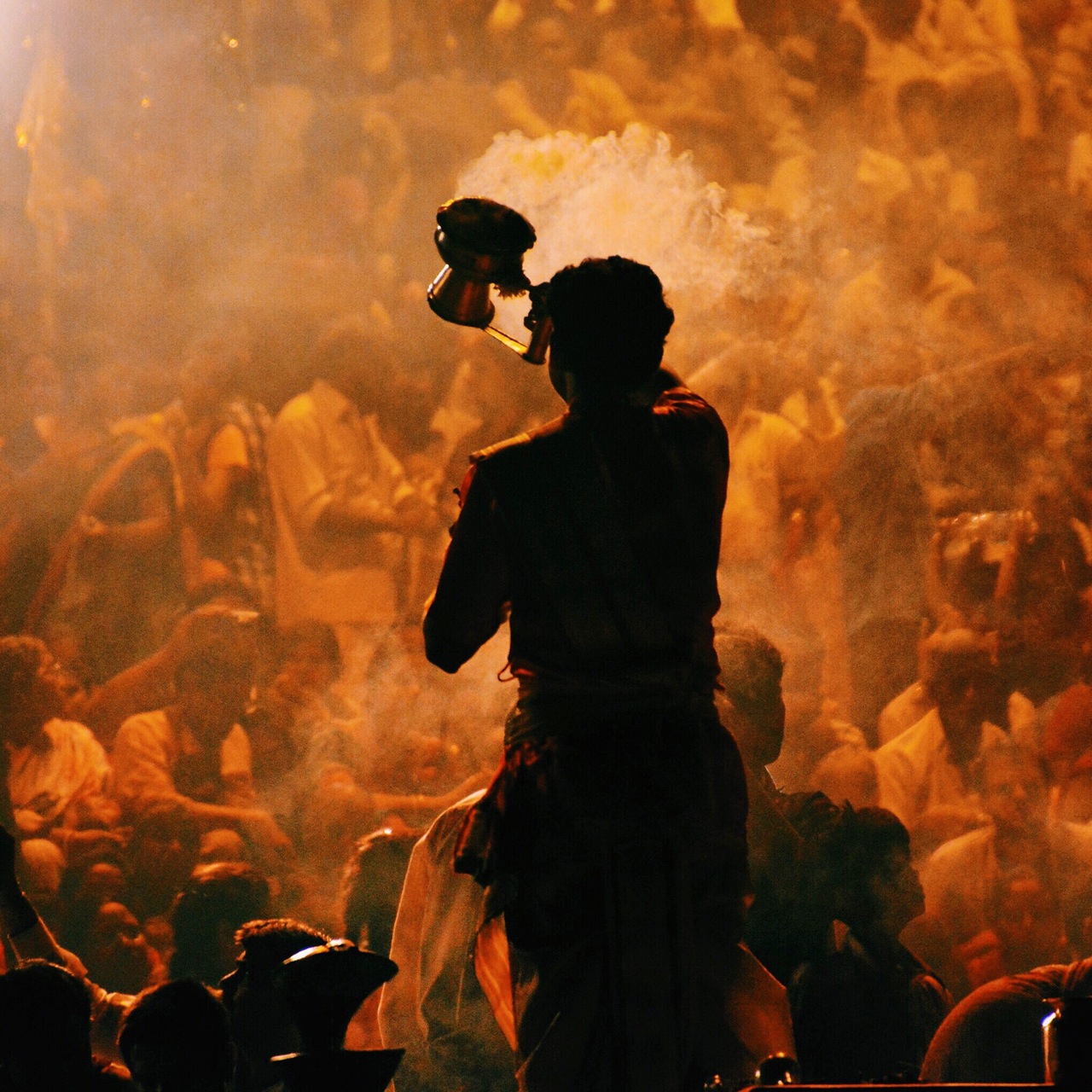
Hindu mythology is rich in symbolism and meaning. The symbolic meaning of Agni is a profound example and underscores the genius of ancient Sages. The timeless wisdom left for us in mythology and religious scripture is truly beneficial.
However, to benefit from the wisdom of ancient sages you need to understand the esoteric meaning of symbolism. The hidden meanings reveal far more relevant information that exoteric explanations provided by organised religions and academia.
Modern historians and archaeologists often refer to our ancient ancestors as primitive. Yet when you interpret the earliest writings of ancient cultures, it is evident they were far more advanced than they are given credit for.
That numerous researchers have demonstrated the engineering works required to build the pyramids at Giza in Egypt and the temples of Mesoamerica were ahead of there time is intriguing evidence, to say the least.
As a matter of fact, the conclusion among many of these researchers is the feats of engineering would not have been possible with the tools available at the time (according to the official timeline of history).
When you decode the esoteric symbolism written into ancient literature, you come to the same conclusion as the engineers and stonemasons.
Our ancient ancestors did not have “primitive” minds.
On the contrary, you find they had advanced knowledge of science and medicine. They understood the human condition, how energy transforms, the capacity to heal, aspects of human consciousness and how to transcend the material plane.
Although this knowledge has been available for thousands of years, it has been forgotten, ignored or suppressed. Today, as the world falls apart around us, people are beginning to awaken to this timeless wisdom.
In doing so, we are discovering the secrets to life – and at the same time recognising the genius of wise men than existed at least 7000 years ago. Our ancient ancestors were much more advanced than scholars would have us believe.
The Rig Veda is the oldest surviving work of literature that we know of. The books are the first examples of Hindu mythology and appear to reference physical laws that scientists have only rediscovered in the last 100-150 years.
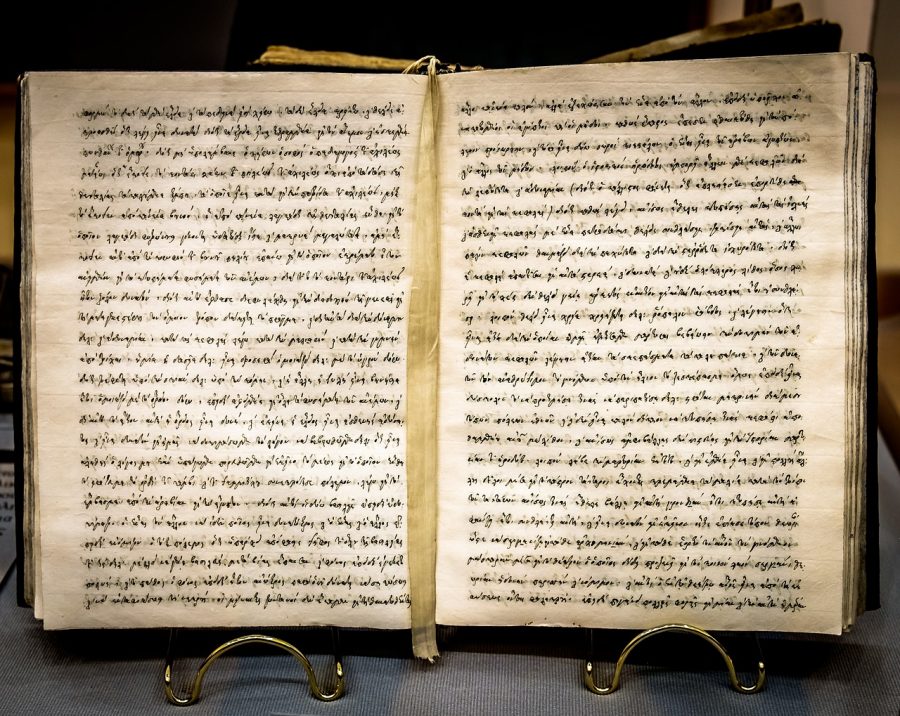
Agni mostly featured in Vedic hymns in association with the sun, lightning, comets, domestic fires, the funeral pyre, and the digestive fire of the stomach. He is most closely related to sacrificial fires which positions him as a god with the power to destroy and recreate.
As a matter of fact, Agni is portrayed as a “creator-maintainer-destroyer,” the three qualities of the Hindu Trimurti, Brahma, (creator), Vishnu (maintainer) and Shiva (destroyer). Given the Supreme Gods of the Trimurti take a central role in Hindu mythology underscores the importance of Agni.
In later Hindu texts, with the rise in prominence of the Trimurti, Agni, together with his brothers Indra and Surya begin to lose importance. Whereas Indra is known as the King of the Gods akin to the Greek god Zeus, Agni ruled the earth and Surya ruled the sky and heavens.
So what does Agni represents in Hindu symbolism?
Before we can decode the symbolic meaning of Agni, we need to take a look at his functions in Hindu mythology together with some of the symbols attributed to him.
When decoding ancient symbolism, it’s important to remember the gods, demons and objects reflect attributes of human nature. Even when the symbolism corresponds with objects, animals or elements of the natural world, the overarching correspondence can still be tied to human nature or the functionality of the body and mind.
“All the mythologised process of nature, such as summer and winter, the phases of the moon, the rainy seasons, and so forth, are in no sense allegories of these objective occurrences; rather they are symbolic expressions of the inner, unconscious drama of the psyche which becomes accessible to man’s consciousness by way of projection – that is, mirrored in the events of nature.” ~ Carl Jung, The Archetypes and the Collective Unconscious
For example, we are told Agni is associated with ‘seven winds’. That may have something to do with the digestive fire but I don’t think so.
In Hindu art, Agni is depicted with red skin and two heads. This suggests a dual aspect. Perhaps he is two-faced. As it turns out, Hindus love and fear the fire god, because, like fire, he can be creative and destructive.
I’ll tell you now, this is not why he is depicted with two-faces. As a matter of fact, a hymn in the Rig Veda describes him with three heads and three mouths. This is a reference to aspects of consciousness which Freud suggested has three parts; id, ego and superego.
“Bright, seven-rayed god, how manifold thy shapes
Revealed to us thy votaries: now we see thee
With body all of gold; and radiant hair
Flaming from three terrific heads, and mouths,
Whose burning jaws and teeth devour all things.
Now with a thousand glowing horns, and now
Flashing thy lustre from a thousand eyes,
Thou’rt borne towards us in a golden chariot,
Impelled by winds, and drawn by ruddy steeds,
Marking thy car’s destructive course with blackness.”
Agni is usually shown riding either a goat or a ram, the most commonly sacrificed animal in India at the time. The presence of sacrificial animals typifies the animal nature of mankind. Given Agni is riding the beast, it signals that he has control over his animal nature.
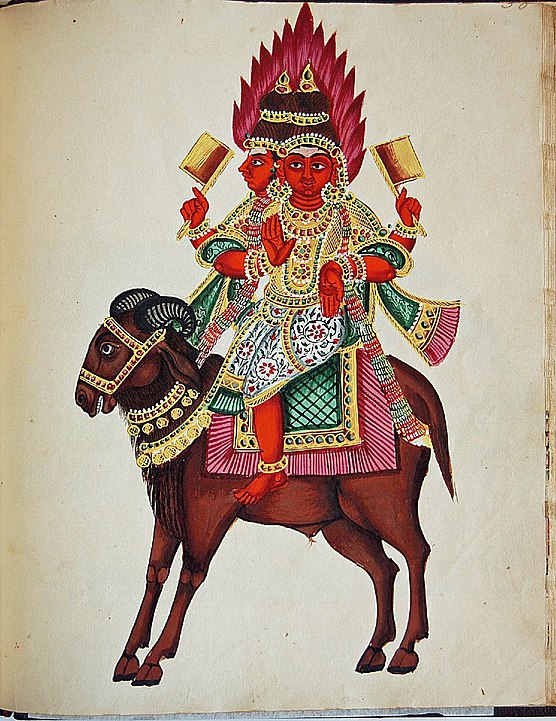
Individuals that are not able to control their animal urges for food and sex are said to be influenced by the reptilian brain. This is the oldest part of the brain but also the least sophisticated in terms of cognitive function. Psychologists warn ‘not to listen to your reptilian brain.’
According to various myths, Agni is tasked with delivering human sacrifices to the gods. However, he is initially afraid to fulfil his obligations and goes into hiding. The various myths each give a different hiding place but each time gives us information about the true symbolic meaning of Agni rather than the fickle official version of Agni.
The first myth explains Agni tries to hide is the subterranean waters but the fish expose him to the gods. As a result, Agni cursed them so that fish would become the easy prey of men. Fish represent inspiration, the seed of an idea. Because they live in water, they are considered pure. Water represents the unconscious.
Agni curses the fish saying, “Since thou hast pointed me out may men slay thee whenever they like.”
Sure enough, mankind has a tendency to quash ideas that arise as inspiration before we give them the opportunity to take hold.
Deepwater usually has a maternal significance corresponding to the “womb.”
In another attempt to hide Agni is given away by frogs. The association with water again relates to the unconscious. Frogs are also associated with fertility and rebirth. In turn, this is symbolic for improved ideas and information.
The next animal to give away Agni hiding place is the elephants which symbolise wisdom, power, patience and prosperity. Elephants also share an association with memory – which arise from the subconscious. Note that the force of nature has shifted from the unconscious to the subconscious.
To clarify here, the unconscious is an aspect of your conscious nature that is unknown to you. This may either be because you have not had an experience in which an aspect of your consciousness was allowed to express itself, or part of your consciousness has been repressed. I explain this in greater detail in the Beginner’s Guide to Symbolism Course.
Back to Agni.
In a last desperate attempt to hide from the gods, Agni hides in a sami tree but is given away by a parrot – a symbol of truth. Trees are a symbol of the mother archetype, one aspect of which relates to the womb which is symbolic for the nurturing of creation.
Interestingly, sticks from the sami tree are still used in Hindu rituals to make fire. An interesting creation myth of Agni is that his parents are two sticks. The mother is the lower stick in which the upper stick – the father – is inserted to make a fire. This sexual image denotes the male and female aspects required for energy to become manifest.
There is also a psychological focus to this story. When Agni is born, his fire devours his parents, the sticks (Rv. X. 79 4). This is analogous to children replacing their parents at the helm of the family. In psychological terms, it is information, ideas, beliefs, attitudes etc being replaced by improved information.
When Agni hides in the sami tree, he is reported to the gods by a parrot – a symbol of Truth. This is analogous of self-realisation. Eventually, with better information, you learn the Truth about your True Nature.
But the symbolic meaning of Agni does not end there.
A feature of Hindu mythologies involving Agni is the evolution of his character. There is a significant development that gradually carves out a broader understanding of the fire god’s symbolic meaning. To be fair, he does feature in 200 hymns.
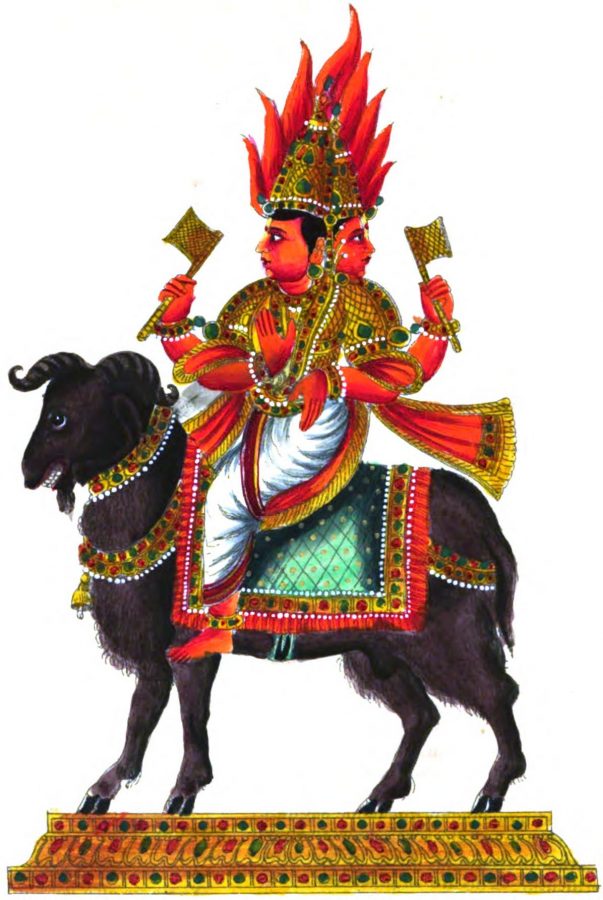
In Hymn One of the Rig Veda, we are told Lord Agni is the Minister of sacrifice…who presents offerings to the Gods. This is our first clue as to the true symbolic meaning of Agni.
1 I Laud Agni, the High Priest, God, Minister of sacrifice,
the divine, the possessor of great wealth who presents to offering to the Gods.
2 Worthy is Agni to be praised by living and ancient seers.
He shall bring hitherward the Gods.
3 Through Agni, the worshipper obtains wealth, most rich in heroes, and the multiplier of mankind.
4 Agni, the perfect sacrifice which on every side, the protector reaches to the Gods.
5 May Agni, the attainer of knowledge, he who is true, renowned and divine,
The God, come hither with the Gods.
6 Whatever blessing Agni may bestow unto the worshipper,
That Aṅgiras, is indeed the truth.
7 We approach thee Agni, day by day with prayer
Bringing thee reverence,
8 Ruler of sacrifices, guard of Law eternal, radiant One,
Increasing in thine own abode.
9 Be to us easy of approach, even as a father to his son:
Agni, be with us for our wealth.
In later myths, we are told Agni has three sons and 45 grandchildren. In the Vayu Purana, the number of sacred fires attributed to Agni is 49. In gematria, 49 corresponds with the number four; 4+9 = 13, 1=3 = 4.
In number symbolism, four relates to the physical plane. It is the point when libido first becomes manifest as a physical reality and is thus fully evolved in your conscious mind.
Agni also has three older brothers – meaning he is the fourth born.
In addition, the Bṛhad-devatā reveals that Agni dissolves into the earth and his body parts become earthly things. His liver became iron, his bile emerald, his phlegm crystal, his bones the Devadâru tree and so on. Again, the symbolism here point towards Agni representing the material plane – or more precisely, something belonging to the physical realm rather than the spiritual realm.
We can, therefore, determine that the symbolic meaning of Agni is not related to the unconscious, and thus not relative to an archetype.
The eminent psychoanalyst Carl Jung, a keen alchemist, recognised that archetypes in world mythologies are symbolic representations that reflect aspects of the human psyche. He postulated these archetypes are universal to mankind, and when repressed in the unconscious project themselves on to the ego.
“Every archetype, at its first appearance and so long as it remains unconscious, takes possession of the whole man and impels him to play a corresponding role.” ~ Carl Jung, Psychology and Alchemy
You will probably have had experiences when you did something you wouldn’t ordinarily do. These occasions are accompanied with bewilderment and the words, “what on earth was I thinking?” it “I don’t know what came over me!” You may also have witnessed people close to you also “acting out of character.”
Have you also wondered sometimes why particular thoughts appear in your mind; thoughts that simply cannot be related to your personal experience, and thus do not come from the subconscious?
These thoughts and actions come from the Unconscious. Many of the gods in world mythologies represent these aspects of human nature. Jung postulated these Unconscious archetypes project themselves on to the conscious mind and prompt actions you may not ordinarily do of your own free will.
There are symbolic features that connect Agni with both the Unconscious and the conscious mind. Firstly, he is the “messenger of the gods” and crosses both worlds (the physical plane and the spiritual plane). This lends him a relationship with the Unconscious even though he does not represent an archetypal aspect of human nature.
Let’s take a closer look why.
There are a couple of stories pertaining to the birth of Agni. His parents were Kashyapa, one of the seven sages, and Aditi, a personification of the Unconscious.
Scholars appear to be confused by accounts of Agni’s birth. For example, commentary published on Ancient.eu deliver these words of, ahem, wisdom.
“Agni is the son of the Celestial Waters, and that element is closely connected with fire which is thought to be carried down to earth within rain. From there fire is drawn up by vegetation and so when two sticks are rubbed together fire appears.”
To clarify, in esoteric symbolism ‘Celestial Waters’ correspond with a body of water and relate to the Unconscious, which is Aditi. So far so good. Water and fire are also closely connected, but only in creation stories. I have yet to read a creation myth that does not feature both water and fire.
However, there are several things wrong with this statement. The most glaring is that fire does not fall from the sky with rain. That’s ludicrous. Moreover, if sticks are wet from the rain, they would not light. Nor does fire live in sticks which scholars tell us was a belief held by the peoples of ancient India.
The official line in academia is to portray ancient civilisations – or as they are called “primitive man” – as imbeciles. I whole-heartedly disagree. The wise men that penned myths and scriptures such as the Rig Veda had minds that were far from primitive.
On the contrary, they were enlightened.
The richness of the symbolism alone is evidence of that. Moreover, esoteric symbolism is universal, based on a study of nature and not an accident nor a coincidence. Esoteric symbolism is so complex it cannot be the work of a primitive mind.
Furthermore, fire and water are opposites. Fire is male, water is female. Male and female pertain to various forms of human expression. They also refer to the positive (male) and negative (female) charge of energy together with the proton (male) and the electron (female) of an atom.
Atoms are energy. Moreover, they are the building blocks of creation, the physical and the metaphysical reality you experience every second of your waking hours.
Scholars suggest the ancient Indians believed fire came from water because of a myth in which Agni is sent by the gods to locate the missing Indra. Despite scouring the earth, Agni cannot find his brother. He reports back to the gods that the only place he has not searched is the deep waters – the Unconscious.
Agni explains he cannot enter into the water because he would perish. This is significant and gives us the biggest clue as to the symbolic meaning of Agni.
It should be noted that the hymns of the Rig Veda or any other myth should not be taken literally in its entirety. Why scholars fall for this mistake is beyond me. I also find some of the interpretations of symbolism proposed by academia mind-boggling (until I heard academics have to toe the official line or risk being disqualified from their specialist field).
Moving on.
It is also said that Agni is the fire in lightning which is born from the god’s union with the cloud goddess. In the shape of lightning, the fire god causes rain. In mainstream (exoteric) symbolism, rain is linked with fertility which implies Agni is a creator god. This is consistent with Agni being described as a creator, maintainer and destroyer.
Looking at various myths that feature rain, they appear to pertain to Plato’s theory of soul fragments. If bodies of water represent the Unconscious and rain are fragments of water, there is a direct correspondence with the soul.
The “soul” is an ancient word for the subconscious. If you read authoritative alchemical texts or new-age commentaries that mention the word “soul”, replace it with the word subconscious and you will find it still gives precisely the same meaning. For example:
“It is essential for him that the three fundamental soul-forces, thinking, feeling and willing, should have undergone harmonious development before being released from their inherent connection and subordinated to the awakened higher consciousness.” ~ Rudolf Steiner – How To Know Higher Worlds
The gods of Hindu mythology always have a consort which expounds their symbolic meaning. The wife of Agni is Svāhā, a Sanskrit word meaning “well said”. In Tibet, the word translates to “so be it.” The word Svaha is chanted during fire sacrifices and uttered to announce the end of a mantra.
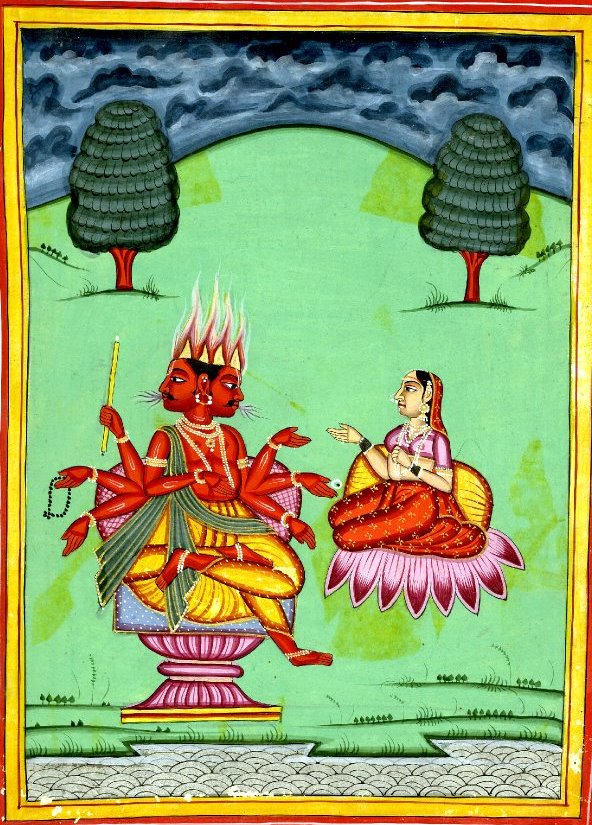
The meaning of Svāhā is also significant to the symbolic meaning of Agni, as are the god’s strong connection with fire sacrifices. In transcendental magic ceremonies, you set an intention and can say something along the lines of “let it be so”. “Well said” also implies an agreeable Truth has been spoken as an intention.
It’s also worth noting that eight of the ten books of the Rig Veda begin with a dedication to Agni and in certain sacrificial rituals the first and last offerings are always dedicated to Agni.
Agni’s association with the number ten reinforces this connection with the beginning and the end. Ten symbolises the end of one cycle is complete and a new cycle has begun. This can be clearly seen in the standard numerical system 0-9.
Rig Veda X. 51 | Varuna: ‘We often longed for thee all-knowing Agni after thou hadst entered the waters and the herbs. It was Yama O brilliant one that discovered thee sparkling forth from ten coverings.’
Again there is a correlation with the transformation of energy. The Laws of Thermodynamics state that energy always transforms. Energy is created, destroyed and transformed. Another word for transformed is “reborn”. Sound familiar? Temperature (fire) is a condition that causes energy to transmute.
These three laws, incidentally, were discovered by western science between 1824 and 1873. The Rig Veda was written in at least 3000 years earlier. Just saying.
The symbolic meaning of Agni also ties him to the chakra system. The fire god is said to ride a chariot drawn by red horses with seven wheels – supposedly representing the seven winds. As a matter of fact, the chariot represents the mind, the wheels are the seven energy centres, or chakras, which are responsible for transferring and transmuting energy.
Agni is associated with various types of fire in Hindu ritual today; the domestic hearth, the sacrificial fire and the funeral pyre; in this latter role, he is said to be delivering the dead to the ruler of Underworld, Yama, for their final judgement.
In esoteric symbolism, the Underworld represents the subconscious.
Fire is associated with light which in turn is associated with knowledge.
The word pyre is the root for pyramid which is the symbolic representation of the One Divine Flame, “the life of every creature” ~ Manly. P Hall, Secret Teaching of All Ages, a 33rd-degree mason and authority on esoteric symbolism.
In the same book, Hall also cites a passage given by Poimandres which reveals a connection between Light (fire) and Mind.
“I thy God and the Light and the Mind which were before substance was divided from spirit and darkness from Light. And the Word which appeared as a pillar of flame out of the darkness is the Son of God, born of the mystery of the Mind. The name of that Word is Reason. Reason is the offspring of Thought and Reason shall divide the Light from the darkness and establish Truth in the midst of the water. That which in you sees and hears is not of earth, but is the Word of Gid incarnate. So it is said that Divine Light dwells in the midst of mortal darkness, and ignorance cannot divide them. The union of the Word and the Mind produces that mystery which is called Life. As darkness without you is divided against itself, so the darkness within you is likewise divided. The Light and the fire which rise are the divine man, ascending in the path of the Word, and that which fails to ascend is the mortal man, which may not partake of immortality. Learn deeply of the Mind and its mystery, for therein lies the secret of immortality.”
To give you some insights into the meaning of the able paragraph, “The Word” in alchemical literature is associated with Reason. Henry Cornelius Agrippa also tells us the element of air is related to Reason also. When we speak The Word, we breathe Air. And that is why Agni is associated with the “seven winds”. I told you it had nothing to do with the digestive system.
You may remember from Hymn 1 of the Rig Veda, Agni is said to bestow wealth upon his worshippers in the human race. This wealth relates to spiritual wealth but, if you choose to, can also encompass material wealth. The key is knowing how to attract material wealth into your life.
However, in order for Agni to bring consciousness to life and lead us to ‘truth’ – that is to say our true selves – we have to sacrifice desires that are born from the ego-centred mind. Thus fire is mostly associated with sacrifices that are required to obtain purity of heart and mind. This is how we attain ‘enlightenment.’
Moreover, the light from within has to be self-knowledge and not the falsehood of illusion which belongs to the ego. Scientists tell us the world is an illusion and most of what we are taught in schools, universities and churches does not often align with the Truth.

The Word is also associated with the libido which Jung explains is “psychic energy over which he has conscious control.’ (Symbols of Transformation). Jung also states:
“The libido, which is not only creative and procreative, but possesses an intuitive faculty, a strange power to “smell the right place,” almost as if it were a live creature with an independent life of its own (which is why it is so easily personified). It is purposive, like sexuality itself, a favourite object of comparison. The “realm of the Mothers” has not a few connections with the womb (fig. 12), with the matrix, which frequently symbolizes the creative aspect of the unconscious. This libido is a force of nature, good and bad at once, or morally neutral.” ~ Carl Jung, Symbols of Transformation
In the above paragraph alone, you can see several key factors that align with the symbolic meaning of Agni; creative and procreative, purposive (Agni makes oblations to the gods), comes from the realm of the mothers – the Unconscious – and is a force of nature that is good, bad and neutral.
So we can also link the symbolic meaning of Agni with the libido, which is psychic energy in the conscious mind. The conscious mind, of course, is related to the physical plane given thoughts, ideas, attitudes etc are an experience of reality.
As I detailed above, Agni, the fire god, has a correlation with Earth. So consider this pearl from Agrippa.
“There are two things, saith Hermes, Fire and Earth, which are sufficient for the operation of all wonderful things: the former is active, the latter passive. Fire, as saith Dionysius, in all things, and through all things, comes and goes away bright; it is in all things bright, and at the same time occult and unknown.” ~ Henry Cornelius Agrippa, Three Books of Occult Philosophy
So far, we know Agni came from the waters of the Unconscious but takes the form of fire which reflects the creative forces of nature. We also know he has a connection with the material plane and bestows wealth in the form of information upon mankind.
We also know fire gods represent the libido which is essentially the vital content in your head, some of which you cultivate into useful knowledge. When you act on good information, you acquire wisdom.
Wisdom is the wealth mentioned in Hymn 1 of the Rig Veda: “Agni, be with us for our wealth.”
The libido is also known in alchemy as “The Great Magical Agent” which Eliphas Levi tells us “is the fourth emanation of the life-principle.”
“Hermes was right when he said of the Great Agent: “The sun is its father, the moon its mother.” Then he adds: “The wind has borne it in the belly thereof,” because the atmosphere is the recipient and, as it were, the crucible of the solar rays, by means of which there forms that living image of the sun which penetrates the whole earth, fructifies it and determines all that is produced on its surface by its emanations and permanent currents, analogous to those of the sun itself. This solar agent subsists by two contrary forces – one of attraction and one of projection…” ~ Eliphas Levi, Transcendental Magic
The Sun is associated with en-lighten-ment, illuminated beings like Agni’s father, the Sage, Kashyapa. The Moon is associated with the Moon Goddess who represents the “womb” or “crucible” of the Unconscious.
Finally, we also know that Agni is connected with the seven chakras which I mentioned above are represented by the wheels of his chariot. In Sanskrit, chakra is a word meaning ‘wheel’. Using the power of your mind, you can actually spin your chakras like a wheel to activate them.
An understanding of the seven-tier chakra system can also guide you to self-knowledge, wisdom and healing. Knowledge of the seven key energy centres from the base of the spine to the crown of the head is becoming so prevalent in today’s society that medical professionals in the West have adopted this age-old eastern enigma to treat their patients.
The mind’s ability to direct energy and balance your chakras is a simple but powerful practice you can use to heal, feel centred and boost your mood.
There is one last symbolic meaning of Agni that I have touched upon already but not explained in any detail. And that is Agni represents the Self/Ego combo which is the aspect of your conscious that you are aware of. It is through this double-headed personality that you express yourself to the world.
The Self is said to be your True Self which is cultivated through self-realisation. Jung also identified the Self exists in the conscious mind and the Unconscious. It is when consciousness becomes aware of itself that you acquire a moment of enlightenment.
Ego, on the other hand, is the false mind that creates delusion. The voice in your head that leads you to believe things that are not true. Both the Self and the Ego acts as the mediator between the higher conscious mind (symbolised by the gods) and the lower conscious mind (symbolised by demons).
In other words, it is our conscious mind that makes decisions based on the information we receive from the higher self and the lower self. This is why Agni is the messenger of the Gods.
Furthermore, it is the conscious mind, caught between the gods and demons of the Unconscious Mind that is ultimately the decision-maker. You decide what to do. The information you have in your head may be surfacing from the Unconscious – Agni born from the Celestial Waters – but it is the Self or the Ego which ultimately makes the decisions.
So are your actions born from the Self or the Ego?
Information from the Self comes from Pure Consciousness. Truth. Information from the Ego comes from the personal conscious. Perception.
The personal conscious is the domestic fire that Agni is associated with. The habitual mind. It is from this mind that habits are formed; addictions, false belief systems, attitudes that do not serve you etc.
This is how you dissolve ego and develop the True Self. This is why Agni said he did not search the depths of the ocean to look for Indra because he would perish. In his emanation as ego, if he went into the Unconscious, he would return as the Self.
It is necessary to overcome the personal programs in your personal consciousness to purify thoughts and emotions. Listen to your higher consciousness because that is the aspect of your nature that wants you to thrive – to mature and evolve physically, emotionally and spiritually.
Now we have deduced that Agni represents the ego, it is further indication that our ancient ancestors were way ahead of modern civilisation and by no means primitive. Sigmund Freud didn’t publish his theory of the ego until 1923.
However, you may remember, that Agni does enter the water and a tree when he is hiding from the gods. Now you know Agni is the Self/Ego mediator, it is easier to understand why he was hiding. He did not want to change his habits or his persona. He did not want to transform into something else.
Yet each time he hides (as the ego) he is pointed out by fish (inspiration), parrot (Truth) and elephants (wisdom) which are all attributes of the Self. He also hides in a tree which is symbolically connected with the body and thus the personal conscious. This is Agnis connection to “earthly things”.
Rain is also a symbolic representation of subconscious programs. We are born pure, but as we experience life, purity is polluted with poor information fed to us by society. The purity of the “soul” becomes fragmented. I explain this in greater detail in the Beginner’s Guide To Symbolism.
Today’s psychologists know the ego does not start to develop until around the age of seven. Again, the scriptures point towards a knowledge of the subconscious mind and its gradual development in children.
In Book 13 of the Mahabharata it is written:
“Brahman said, ‘Ye foremost of deities, Agni was not there at the time the curse was denounced by the goddess. Even he will beget a son for the destruction of the enemies of the gods. Transcending all the deities and Danavas and Rakshasas and human beings and Gandharvas and Nagas and feathery creatures, the offspring of Agni with his dart, which in his hands will be a weapon incapable of being baffled if once hurled at the foe, will destroy Taraka from whom your fear hath arisen.”
Subconscious programs are typically planted when you are a child and can aggregate into more complex stories as you get older. Many of these stories are fear-based, fuelled by media scaremongering, political propaganda, violence on TV and in movies and the general antagonism mankind have towards strangers.
Suffice to say, subconscious programs with bad information do not serve your best interests. They make you paranoid, develop a lack of self trust, self-worth, and self-love, nurture destructive tendencies and all the other problems you identify in yourself and others. In extreme cases, as seen with religious fanatics, deep-rooted beliefs can get way out of control.
